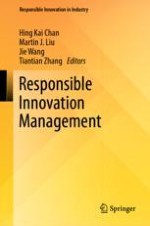
2022 | OriginalPaper | Chapter
Responsive Innovation of Blockchain Technology in Traditional Supply Chains
Authors : Jiayu Hu, Zhen Tan
Published in: Responsible Innovation Management
Publisher: Springer Nature Singapore
Activate our intelligent search to find suitable subject content or patents.
Select sections of text to find matching patents with Artificial Intelligence. powered by
Select sections of text to find additional relevant content using AI-assisted search. powered by